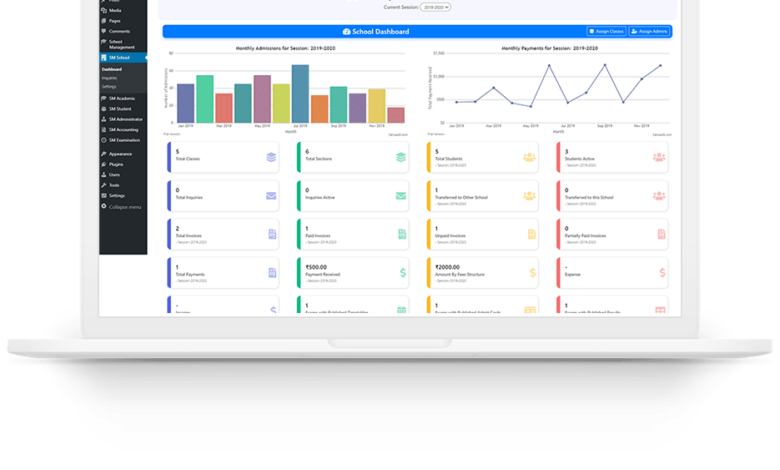The Transformational Power of School Management Software: Insights from Experts

In today’s fast-paced digital age, the education sector has undergone a significant transformation. School management software has emerged as a game-changer, streamlining administrative tasks and enhancing overall efficiency in educational institutions. To gain a deeper understanding of the transformative impact of school management software, we’ve gathered insights from experts in the field.
1. Empowering Educators with Data-Driven Insights
Dr. Sarah Martinez, an educational consultant with over 15 years of experience, emphasizes the importance of data-driven decision-making in education. “School software enables educators to access real-time data on student performance, attendance, and behavior,” says Dr. Martinez. “This empowers teachers and administrators to identify areas of improvement and tailor their teaching strategies accordingly.”
2. Streamlining Administrative Tasks
John Anderson, a school administrator with a passion for technology, highlights how school management software simplifies administrative tasks. “Gone are the days of manually managing student records, timetables, and fees,” Anderson explains. “With the right software, schools can automate these processes, reducing administrative workload and minimizing errors.”
3. Enhancing Parent-Teacher Communication
Parent involvement is crucial for a child’s educational success. Maria Johnson, a veteran teacher, believes that school management software strengthens the bridge between parents and teachers. “Through messaging features and portals, parents can stay updated on their child’s progress,” says Johnson. “This open line of communication fosters collaboration and a supportive learning environment.”
Read more here
4. Financial Transparency and Accountability
Managing finances in educational institutions can be complex. Mark Taylor, a financial analyst specializing in education, underscores the importance of financial transparency. “School management software provides detailed financial reports and budget tracking,” Taylor states. “This transparency ensures that resources are allocated efficiently and helps maintain financial accountability.”
5. Customization for Diverse Needs
Every school is unique, and Dr. Lisa Ramirez, a renowned education researcher, praises the flexibility of school management software. “These systems are customizable to meet the specific needs of each institution,” Ramirez notes. “Whether it’s a small private school or a large public district, the software can adapt to accommodate various educational models.”
6. Student-Centric Learning
Dr. James Davis, a pioneer in the field of educational technology, believes that school management software plays a pivotal role in promoting student-centric learning. “With features like online assignments and virtual classrooms, students can access resources and materials anytime, anywhere,” says Dr. Davis. “This flexibility caters to individual learning styles and fosters self-directed learning.”
7. Data Security and Privacy
In an era of heightened cybersecurity concerns, ensuring the safety of student data is paramount. Sarah Mitchell, a cybersecurity expert, explains how school management software addresses this concern. “Leading software solutions implement robust security measures to protect sensitive student information,” Mitchell affirms. “This instills confidence in parents and safeguards against data breaches.”
8. Scalability for Growth
As educational institutions expand, scalability becomes a crucial factor. David Carter, a school management software developer, discusses this aspect. “Modern software is designed to accommodate the growth of schools and districts,” Carter states. “This scalability ensures that the software remains a valuable tool as institutions evolve.”
9. Improved Teacher Efficiency
Teacher workload is a significant concern in education. Stephanie Baker, a passionate educator, highlights how school management software can alleviate some of the burdens. “Automated grading, attendance tracking, and lesson planning tools save teachers valuable time,” Baker explains. “This allows them to focus more on what matters most—teaching.”
10. Parent Engagement Beyond the Classroom
Finally, Dr. Michael Adams, a leading expert in educational technology, underscores the role of school management software in extending learning beyond the classroom. “With online resources and interactive tools, parents can actively engage in their child’s education,” says Dr. Adams. “This collaborative approach strengthens the educational ecosystem.”
In conclusion, the transformative power of school management software is undeniable. It empowers educators with data-driven insights, streamlines administrative tasks, enhances communication, ensures financial transparency, and promotes student-centric learning. Additionally, it addresses critical concerns such as data security, scalability, and teacher efficiency. As the education landscape continues to evolve, school management software remains an essential tool for schools and districts committed to delivering a quality education in the digital age.
Are you ready to unlock the potential of school software in your educational institution? The experts have spoken, and the consensus is clear: it’s a powerful tool that can revolutionize the way we educate and prepare the leaders of tomorrow.
About Author
Meet Rabia Rasheed, a passionate writer with a keen interest in sharing valuable insights and tips on school management systems, particularly eSchool. As an expert in this field, Rabia has a wealth of knowledge and experience that she is eager to share with educators and school administrators alike. So, without further ado, let’s dive into the world of the school management system with Rabia Rasheed





